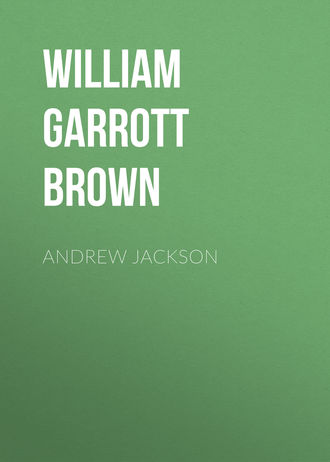 полная версия
полная версияAndrew Jackson
The final settlement came at the very end of Jackson's administration. The presidential election of 1836 had fulfilled his wish that Van Buren should be his successor. In January, 1837, the resolution of censure was solemnly expunged from the records of the Senate. That body being now controlled by his friends, and his enemy, John Marshall, being dead, he named Taney Chief Justice, and the nomination was confirmed. He issued a farewell address to the people, after the manner of Washington, and stood, a white-haired, impressive figure, to watch the inauguration of Van Buren; then he journeyed home to The Hermitage to receive his last glorious welcome from his neighbors.
It was the most triumphant home-coming of them all. He had beaten all his enemies. Clay, wearied out with politics, was again in retirement; Adams, whom he found a President, was leading a minority of representatives in a new sectional struggle, the fight against slavery; Calhoun, whom he found but one step from the presidency, was a gloomy and tragical figure, the Ishmael of American politics. As for his friends, he left them in power everywhere, – in congress, on the bench, in the White House. To friends and enemies he had been like fate.
There was left for him a peaceful old age, and a calm and happy deathbed. Neighbors, political associates, old comrades, famous foreigners, visited The Hermitage to see the man who had played so great a part in history. Like Jefferson at Monticello, he guided with his counsel the party he had led. The long struggle over slavery was now begun, and soon the annexation of Texas took the first place among public questions. The old man had encouraged Houston to go to Texas, and had done all he could, and more than any other President would have dared, to forward the movement for independence. Now that Texas was ready to come into the Union, he heartily favored annexation. In 1844, Clay and Polk were candidates for the presidency, and Jackson's influence, still a power, was freely exerted for Polk and annexation. It was as if Clay, now an old man also, were once more about to lift the cup to his lips, and the relentless hand of Andrew Jackson dashed it to the ground.
Yet Andrew Jackson declared before he died that he forgave all his enemies. He had promised his wife, whose picture he wore in a great locket next his heart, whose Bible he read every day at the White House, that when he should be free of politics he would join himself to the church; if, he said, he made a profession while he was still before the people, his enemies would accuse him of hypocrisy. He kept his word. Trembling and weeping, he stood before the altar in the tiny church he had built for her and took the vows of a Christian. It had been hard for him to say that he forgave his enemies; hardest of all, to say that he forgave those who had attacked him while he was serving his country in the field. But after a long pause he told the minister he thought he could forgive even them.
June 8, 1845, in his seventy-ninth year, he died. His last words to those about him bade them meet him in heaven.
What is the rightful place in history of the fiery horseman in front of the White House? The reader must answer for himself when he has studied for himself all the great questions Jackson dealt with. Such a study will surely show that he made many mistakes, did much injustice to men, espoused many causes without waiting to hear the other side, was often bitter, violent, even cruel. It will show how ignorant he was on many subjects, how prejudiced on others. It will show him in contact with men who surpassed him in wisdom, in knowledge, in fairness of mind. It will deny him a place among those calm, just great men who can see both sides and yet strive ardently for the right side.
But the longest inquiry will not discover another American of his times who had in such ample measure the gifts of courage and will. Many had fewer faults, many superior talents, but none so great a spirit. He was the man who had his way. He was the American whose simple virtues his countrymen most clearly understood, whose trespasses they most readily forgave; and until Americans are altogether changed, many, like the Democrats of the 'Twenties and 'Thirties, will still "vote for Jackson," – for the poor boy who fought his way, step by step, to the highest station; for the soldier who always went to meet the enemy at the gate; for the President who never shirked a responsibility; for the man who would not think evil of a woman or speak harshly to a child. Education, and training in statecraft, would have saved him many errors; culture might have softened the fierceness of his nature. But untrained, uncultivated, imperfect as he was, not one of his great contemporaries had so good a right to stand for American character.


